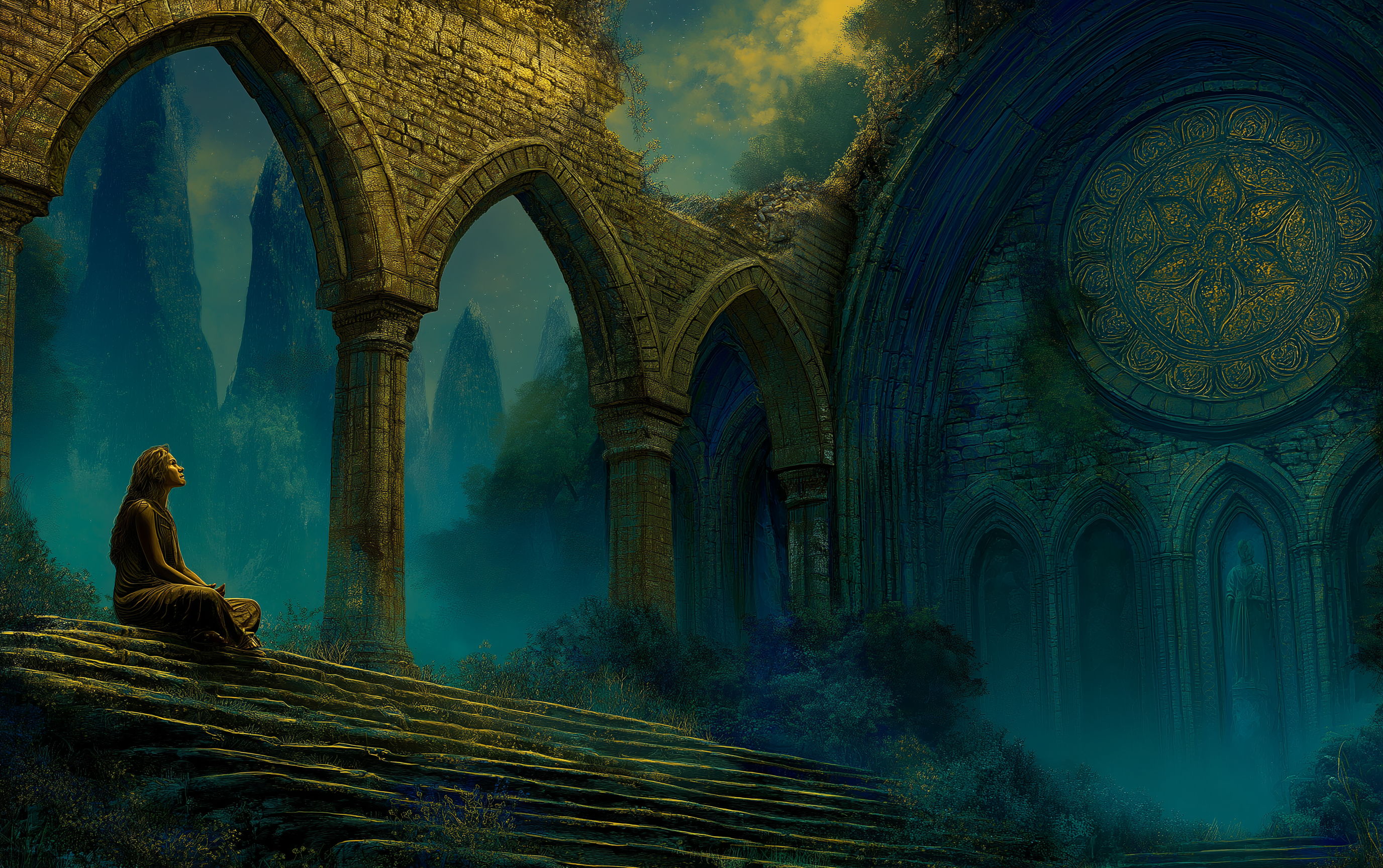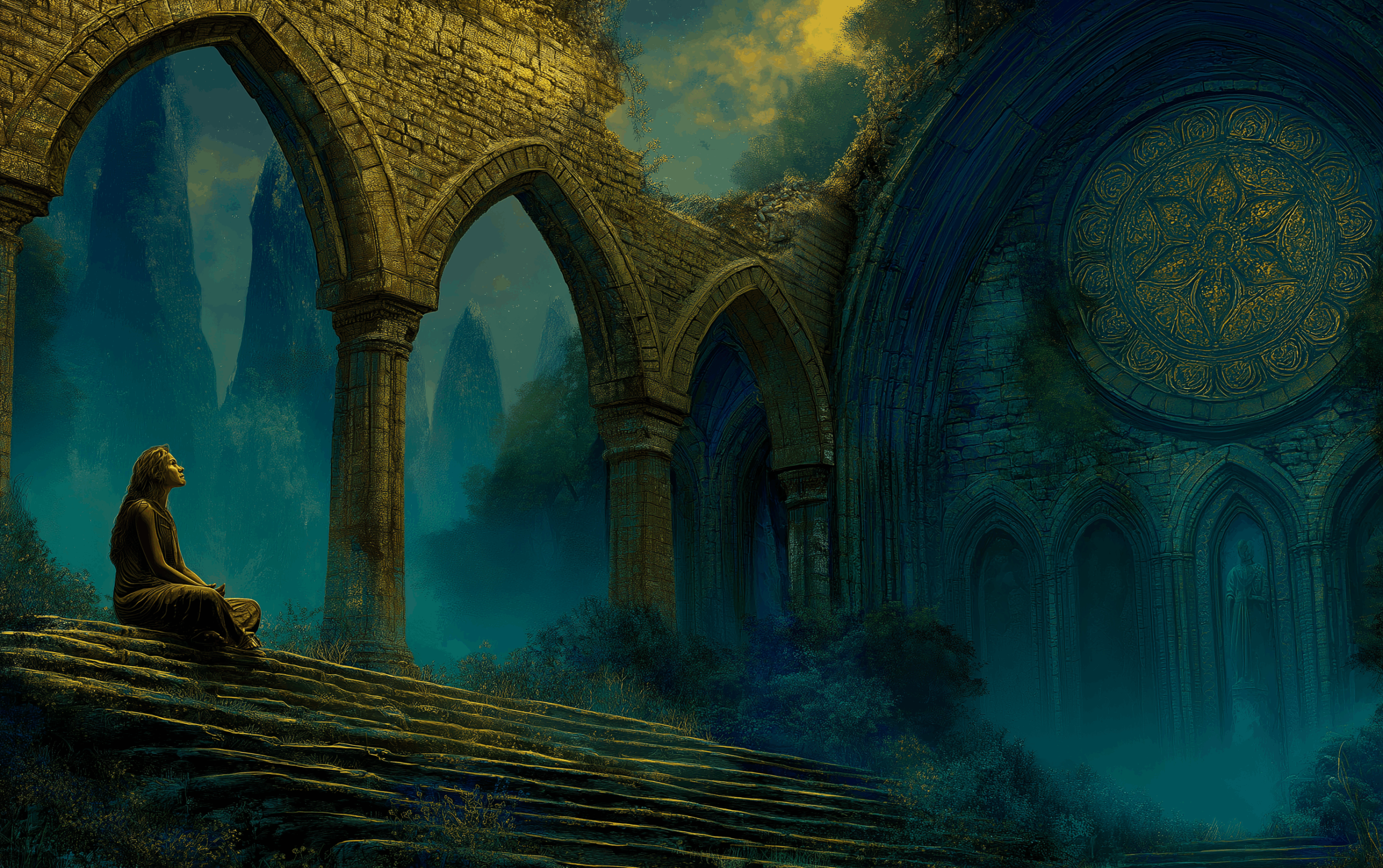Amid Ashes – Among the Ruins
“In tossing slumbers on my wakeful bed,
Betwixt the living and the dead,
Thy hand alone, Lord, help me heal.”
— Anne Bradstreet, “Upon Some Distemper of Body”
Meditative Exposition
There are days, sometimes a stream of days, when the heavens close before us like a heavy door.
Not bolted. Not vacant. Just… closed.
We knock, but there is no sound from within — only a lingering echo of our own knocking. Prayer becomes a kind of listening. Faith, a kind of waiting. The room is not unoccupied, yet the Presence within remains unseen, unspeaking.
Anne Bradstreet knew this silence.
From her sickbed she wrote of being “betwixt the living and the dead.”
The night stretched on, her pulse uncertain, her soul tossed between pain and prayer.
Still, she whispered: “Thy hand alone, Lord, help me heal.”
She did not deny the hand that afflicted her; she named it.
That naming is faith.
The Puritans spoke of such silence not as abandonment, but as withdrawal for refinement — the wise Teacher stepping back so the student might learn to love the Giver more than the gifts.
This was no cruelty, they said, but divine pedagogy: God forming endurance where emotion once stood.
Silence, in this light, is a severe mercy.
We prefer a talking God, but He prefers a listening child before He speaks.
Bradstreet’s little poem — written amid fever and fear — holds more theology than a treatise:
the God who wounds and the God who heals are the same.
His silence is not the absence of power but the presence of purpose.
Like Job, she did not curse Him.
Like the psalmist, she sang from her bed of ashes.
And her song, though quiet, outlived her pain.
“Thy name and praise shall be my song,
Thy saving grace my theme shall be…”
This is the music of faith under the hush of heaven.
There is another silence — deeper than illness — the silence of Holy Saturday, when even the Word lay wordless in the tomb. Between “It is finished” and “He is risen,” heaven itself seemed to hold its breath.
It was there, in that cosmic stillness, that redemption was being worked in secret.
Bradstreet’s suffering, and ours, participate in that mystery.
The silence of God does not mean the absence of His work.
It means that the work has gone underground — into the dark soil where seeds wait to break.
When the voice falls silent, faith must learn to see.
When the warmth withdraws, hope must learn to remember.
When the presence hides, love must still adore.
Anne Bradstreet’s frail body became a pulpit for this truth:
God’s silence is not the end of prayer — it is the transformation of prayer into trust.
She waited not for explanation but for sight:
“Till I shall see Thee, in Thy glory bright,
When faith shall end in perfect sight.”
That is the pilgrim posture amid ashes:
Faith carried not by feeling, but by memory.
Trust held together by the quiet hands of love.
Prayer of Lament
O Hidden Healer,
You who dwell in silence and speak in whispers—
I lie between the living and the dead,
and my body knows what my heart cannot name.
Your stillness feels like distance.
Your silence like refusal.
Yet still I call upon Your hand.
For even in the hush, I know You are here.
Let me rest in the dark without despair.
Teach me to wait until faith becomes sight,
and song returns to these trembling lips.
Till then, let my breath be prayer enough.
Amen.
Selah Box
Scripture Reading:
Psalm 13; Job 23:3–10; Lamentations 3:25–33; Mark 15:42–47
Reflective Question:
When divine silence descends, what fears rise to speak in its place?
How might you, like Bradstreet, name the hand that wounds and still trust it to heal?
Practice:
Read Anne Bradstreet’s “Upon Some Distemper of Body” aloud.
Pause between each line.
Notice how her frailty becomes faith, how her silence becomes song.
Then sit for five minutes in unspoken prayer —
not asking, not explaining — simply being held.
Every hard journey is eased by good companions, and your steps alongside mine are a gift to me.
Should you wish, you may contribute some coin to the Pilgrim’s Purse.

